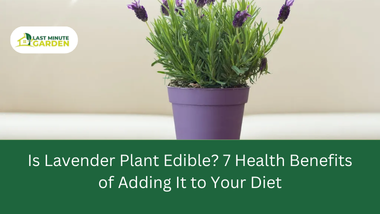Is lavender plant edible? Yes, the lavender plant is adorned with violet flowers and green or pale grey leaves, both flowers and leaves can be eaten and have a pleasant flavor.
The name lavender comes from the Latin verb “to wash.” Throughout history, it was commonly used in baths to help purify the body and spirit. Today, it is added to many hand soaps and body washes due to its aromatic fragrance.
For those new to the idea of cooking with lavender, it has several health benefits when consumed.
1. A Boost of Antioxidants
One of the primary reasons people ask the question is lavender plant edible is because of its antioxidant properties.
Antioxidants are substances that help protect your body against the damaging effects of free radicals, which are unstable molecules that can harm cells. Foods rich in antioxidants can support your overall health, and lavender happens to be one of them.
Lavender contains polyphenols, a type of antioxidant known for its potential to reduce oxidative stress, and phenolic acids, such as rosmarinic acid, caffeic acid, and ferulic acid.
A simple way to enjoy is by adding dried lavender flowers to your tea or using lavender-infused honey. These options can provide a subtle floral taste and deliver antioxidants to support your immune system and cellular health.
2. A Natural Aid for Digestion
Lavender plants have traditionally been used to support digestion. Lavender’s natural oils have compounds that can soothe the stomach and help alleviate issues like bloating gas, and digestive discomfort.
Making lavender tea is a great option to ease indigestion. Simply steep a teaspoon of dried lavender flowers in hot water for a few minutes, strain, and enjoy. The warm tea can be comforting after a meal and may help support your digestive processes.
For those who enjoy experimenting in the kitchen, you can also add a pinch of dried lavender to baked foods, Just be sure not to use too much, as its flavor can be quite strong.
3. Stress and Anxiety Relief
One of the most appreciated qualities of lavender is its calming nature. But how does this translate when it comes to consuming lavender? Lavender contains linalool, a compound known for its relaxing effects.
Many people ask the question is lavender plants edible and capable of easing stress? lavender essential oil is used for relaxation, and eating it can have a similar calming effect. Adding a few dried lavender buds to desserts, like lavender-infused shortbread cookies or lavender lemonade, can help you unwind. These treats can provide a sense of calm without the need for traditional supplements.
Start your day with a cup of lavender tea or a small lavender-infused treat. It’s a delicious way to find a moment of peace and relax your mind.
4. Improves Quality Sleep
Throughout history, it has been used to remedy various ailments including insomnia, anxiety, depression, and fatigue. Consuming lavender in food or drinks may be a natural way to improve sleep quality, especially if you struggle with occasional insomnia or restlessness.
Dried lavender has only a few calories per tablespoon and is free of fat and cholesterol. Research has shown that lavender oil may help alleviate insomnia, anxiety, and stress.
Just add lavender tea to your nighttime beverage to calm your nervous system to promote better sleep.
5. Supports Heart Health
You might be surprised to learn that it can support heart health. Lavender is known to have natural compounds that may help reduce blood pressure levels and maintain a healthy heart rate.
Lavender plants alone are not a substitute for medical treatment, but adding them to a heart-healthy diet can be a delightful complement. Add lavender to your salad dressing or sprinkle lavender to your morning oatmeal.
Consuming lavender as part of a balanced diet may help keep your heart in good shape by promoting relaxation and reducing stress, which are important factors in maintaining cardiovascular health.
6. Anti-Inflammatory Benefits
Lavender contains natural anti-inflammatory properties such as linalool, and linalyl acetate, which can be beneficial for those who experience minor aches or discomfort due to inflammation.
A simple way to enjoy lavender’s anti-inflammatory benefits is through lavender tea or by adding it to a fruit salad. For example, you can sprinkle a small amount of dried lavender over fresh berries. This combination pairs well with other anti-inflammatory foods, like blueberries or chia seeds.
Incorporating lavender into your diet may provide a gentle way to soothe inflammation. Just remember to use lavender in moderation to avoid overpowering other flavors in your dish.
7. Skin Health Support
Is lavender plant edible? Another reason people search for is due to its potential benefits for healthy skin.
Lavender contains antioxidants such as phenolic acids and flavonoids, that combat free radicals, which can lead to premature aging and skin damage. These antioxidants help reduce fine lines and wrinkles by protecting the skin from oxidative stress.
Lavender’s vitamin E is also a powerful antioxidant that hydrates the skin and protects against environmental stressors, giving it a natural glow.
Plus, the relaxing effect of lavender can help reduce stress, which is known to be a common contributor to skin issues like acne or irritation.
Conclusion
Is lavender plant edible? Yes, it is! Lavender can be a brilliant addition to your diet, offering both delightful flavors and impressive health benefits. From aiding digestion to promoting better sleep and supporting heart health, this plant goes beyond its pleasant aroma.
Next time you’re looking to add something new to your pantry, consider picking up some culinary lavender.
Don’t forget to share your favorite lavender recipes in the comments below, we’d love to hear from you!





